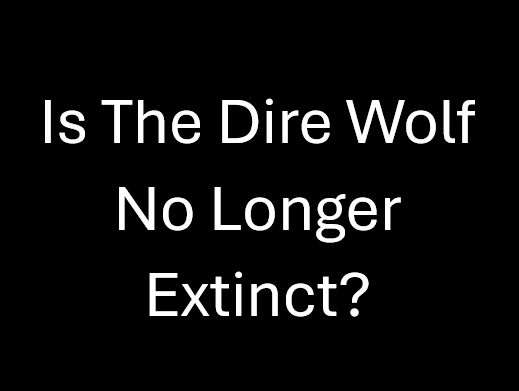Have Scientists Brought Back The Extinct Dire Wolf?
April 8, 2025 – Have scientists finally brought an extinct animal back to life? Colossal Biosciences claims the Dire Wolf is back.
It sounds like something straight out of a movie: scientists bringing back long-extinct animals from the dead. In fact, didn’t they do something with dinosaurs that one time?
But no; this isn’t a Jurassic Park reboot. This is science.
The dire wolf, which used to roam the wilds of North America over 10,000 years ago before going extinct, is back.
Scientists Bring Back Dire Wolf
Time explains that a company called Colossal Biosciences has brought three healthy dire wolf pups into this world. Using DNA found in dire wolf bones, the company rewrote the genomic code of the common grey wolf, crafting three vital embryos. Inserting these embryos in surrogate dogs, the scientists orchestrated the birth of three dire wolves: Romulus, Remus, and their sister, and Khaleesi.
In Colossal Biosciences own words: “Extinction is a colossal problem facing the world. And Colossal is the company that’s going to fix it.”
By bringing three dire wolf cubs to life, the company makes steps towards their goal, but it isn’t the only thing they’ve done. The scientists have also made progress altering woolly mammoth and Tasmanian tiger DNA.
Colossal Biosciences has gained global attention with their achievement; however, it has also received a lot of skepticism.
Too good to be true?
Once other scientists caught word of what Colossal Biosciences had done with the dire wolf, they began expressing concern and skepticism.
In an interview, Professor Corey Bradshaw of Flinders University told Reuters that, “Yes, they have slightly genetically modified wolves. Maybe.” He continued, “does that make it a dire wolf? No. Does it make a slightly modified grey wolf? Yes.”
Speaking with the BBC, Dr Nic Rawlence from Otago University also expressed concern. “What Colossal has produced is a grey wolf, but it has some dire wolf-like characteristics, like a larger skull and white fur,” he told them. He was especially hesitant about what this research could influence society. “Extinction is still forever,” he said, “If we don’t have extinction, how are we going to learn from our mistakes?”
What are the biggest stories trending online today? Read the latest here
Published by HOLR Magazine


